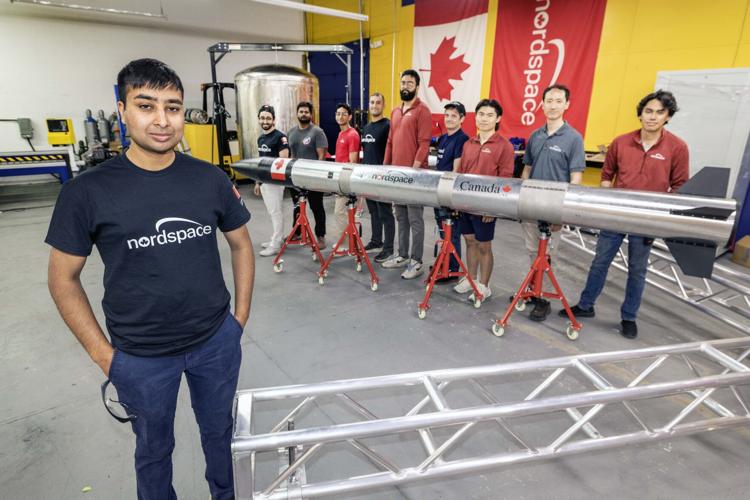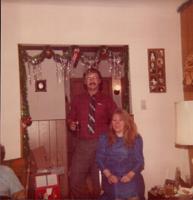This might be the biggest gamble Rahul Goel has ever taken.
He’s always been a risk-taker, like when, as a kid in ÎÚŃ»´«Ă˝, he snuck a TV remote into class and switched the channel to SpongeBob. This time, though, there’s a lot more on the line — about $5 million of Goel’s own cash, to be exact. And he’s using it to fuel his ambitious goal: to build a rocket and send it to orbit.
No Canadian company has ever done so. Goel’s company, NordSpace — founded in 2022 and headquartered in a small, unassuming office next to a Montessori school in Markham — wants to be the first, and he has set mid-August for the company’s first flight, a suborbital test from coastal Newfoundland.
Goel, 33, is not the only one trying. Reaction Dynamics, a Montreal-based rocket startup, is aiming to launch its first rocket this winter. Both companies want to be first, although both say they also want the other to succeed. It’s a ragtag Canadian commercial space race and according to those in the industry, it is long overdue.
Including the European Space Agency, of which France, Germany, Italy and the U.K. are member states, Canada is the only G7 nation without orbital launch capability. Experts warn Canada is at risk of being left behind as the global space economy is projected to be worth nearly $2 trillion (U.S.) within a decade. Meanwhile, relations with the U.S. — which Canada has long relied on for its access to space — have rarely been rockier.
Goel and his staff of fewer than 20 employees believe they can put Canada in the game, and build a lucrative business in the process. But building a rocket is enormously expensive and complex. There’s a graveyard of companies who have spent decades and hundreds of millions of dollars trying, only to fail. Can Goel, a son of immigrants who grew up near Jane and Finch, succeed?
“This is not a research project. This is a business,” Goel recently told the Star. “We have to be able to move fast and we have to be comfortable with some degree of risk and failure.”
Ambitious plans
NordSpace is a place where everyone does everything, where electrical engineers drill holes and propulsion system engineers deal with Transport Canada paperwork. Its offices are tucked away in a quiet business park just off Highways 407 and 404, two buildings over from an exercise equipment store.

NordSpace’s offices are located in a quiet business park in Markham. Its neighbours are a fitness equipment store and a Montessori school.
Andrew Francis Wallace/ÎÚŃ»´«Ă˝ StarThe offices have a dorm-room charm, with empty Amazon boxes on tables and snacks of goldfish crackers and ramen in the kitchen. There is a ping-pong table next to the industrial robotic arm, and drawings of Shrek and Mike Wazowski on a white board. These offices feel lived in — and, indeed, they are. Engineers on rare occasions work 24 hours straight.
NordSpace’s rockets will be built to carry satellites, not people. The rocket the company plans to test in August, known as Taiga, stands just over five metres tall and, if everything goes right, will rise to an undisclosed altitude above earth’s surface — but below the Kármán line, the boundary between earth and space.
Taiga won’t be fully fuelled and the August flight will be used to trial critical systems and operations, Goel said. A later flight of Taiga will be NordSpace’s first to reach space.
The company’s next rocket, Tundra, will be nearly five times taller and capable of carrying up to 500 kilograms to low-earth orbit. Goel intends to have it launch by late 2027.
It is an ambitious goal, and as Goel admits, rocket startups are notorious for horribly optimistic timelines. Plenty of companies have missed deadlines — if they survive at all.
Stephen Matier, CEO of Maritime Launch Services — a company attempting to build a rocket launching site, known as a spaceport, in Nova Scotia — said he is “hugely supportive” of NordSpace and wants them to succeed. But the brutal realities of the industry are unchanging.
“Rockets are hard,” Matier said. “Companies have spent seven, eight, 10 years, and half a billion dollars, to get technology flying and failed in a number of cases.”
“In this industry, there’s a lot of money that can be spent and not a lot of progress that can be made.”
And by starting his company in Canada, Goel may have chosen an even more difficult path. While he said he feels “deeply comfortable here” and sees “so much unrealized potential,” he also believes Canada is comfortable with the status quo.
“This is inherently a very challenging, very capital intensive, very technical challenge. It’s literally rocket science,” Goel said. When it comes to financing a company like NordSpace, “nobody is willing to take that kind of risk.”
That’s why Goel decided to fund the company himself.
NordSpace tests its engines at a site in northeastern Ontario.
NordSpace/YouTubeA prankster turned rocket builder
The way Goel tells it, he came from nothing. The son of immigrants from India, Goel grew up near Jane and Finch and describes himself as a troublemaking child. He pulled “very sophisticated pranks,” he said, but rarely got caught. He was a smart kid, and teachers usually assumed the prankster was someone else.
Goel occasionally travelled to Kolkata, near India’s border with Bangladesh, and visited the planetarium with his grandfather. It helped foster his lifelong obsession with space.
“My world was so small growing up, and the sky just felt so vast and so mysterious,” Goel said. “I got captured by it really early and it just never let me go.”
Goel started out at York University, studying business with the encouragement of his father, but it didn’t last long. He skipped all his classes and instead sat in on math, science and space systems lectures. Eventually, he switched to aerospace engineering at the University of ÎÚŃ»´«Ă˝.
When he graduated, he had the goal of starting a rocket company by the time he turned 30 — self-funded, Goel said, so “nobody has to tell me what I can and can’t do.”
He needed the money first. Lucky for him, another one of his projects was paying off.

Rahul Goel, 33, grew up near Jane and Finch. The Ontario Science Centre was a big part of his childhood. “That’s where I got my start in everything,” he said.
Andrew Francis Wallace/ÎÚŃ»´«Ă˝ StarGoel built PheedLoop, a conference management platform, while living in hostels and his car in South Africa, Peru and the U.S. The company, of which Goel is still CEO, now has about 40 employees.
Goel is also the CEO of a genetics company, Genepika, inspired by his mother, who died from cancer about five years ago. “I don’t want to see more people lose their battle,” he said.
The success of PheedLoop gave him the money to launch NordSpace in 2022. He has invested about $5 million so far and has another $5 million earmarked. He said he’ll “happily invest more.”
If the prospect of failure bothers him, he doesn’t show it.
“I came from nothing. I have a house, I have a car,” Goel said. “I never grew up with any deep personal, materialistic desires. I’d rather keep people in this country and work on something that gets people happy and hopeful.”
His funding has helped NordSpace avoid the delays of a competitor.
A Canadian space race
Reaction Dynamics, based in Montreal, originally planned to launch their first rocket in 2022, but the suborbital demonstration flight has been delayed at least three times. Bachar Elzein, founder and CEO of the company, said funding was to blame.
“When you have little resources,” Elzein said, “you have to focus your energy on keeping the company alive.”

Hubert Fortier (left), a 28-year-old propulsion systems engineer, previously worked at SpaceX. What’s the biggest difference between the companies? “Other than the colour red?” he responded.
Andrew Francis Wallace/ÎÚŃ»´«Ă˝ StarGoel said Reaction Dynamics is NordSpace’s biggest Canadian competitor. He said there are “physics concerns” with how Reaction Dynamics’ hybrid engine will scale up, and it’s “just nothing that we would want to invest in.”
But Goel said he knows Elzein and is rooting for Reaction Dynamics to succeed.
NordSpace also has its detractors. Matier, the Maritime Launch Services CEO, said he worries NordSpace may be spreading itself too thin.
The company is trying to build not just its rockets,Ěýbut also its own Newfoundland spaceport, as well as satellites, which Goel hopes will internalize supply and demand.
“If I were in their shoes,” Matier said, “I would be focusing on one thing, not satellites and not a rocket and not a spaceport … That creates many challenges when you have a full spread of things that you’re trying to pursue at the same time.”
All three CEOs agree Canada needs to be able to launch its own rockets.
NordSpace is building a spaceport in St. Lawrence, N.L., where they plan to launch the Taiga rocket in mid-August.
NordSpace/YouTubeThe global space economy is projected to be worth $1.8 trillion (U.S.) by 2035, according to the U.S. firm McKinsey, and Canada risks being left behind without its own rockets, according to former NASA chief economist Alexander MacDonald. Rocky relations with the U.S. have alsoĚýunderlined the importance of getting to space without the Americans.
“If Canada doesn’t have its own orbital launch capacity,” said MacDonald, a Canadian, “then we will forever be at the whim of others.”
NordSpace is trying to change that, and there’s still lots for Goel to do before the first test launch in mid-August. On this day, after his interview with the Star, Goel planned to check on his other companies, then fly out to St. John’s to prepare for launch.
He had been too busy to pack.
































To join the conversation set a first and last name in your user profile.
Sign in or register for free to join the Conversation